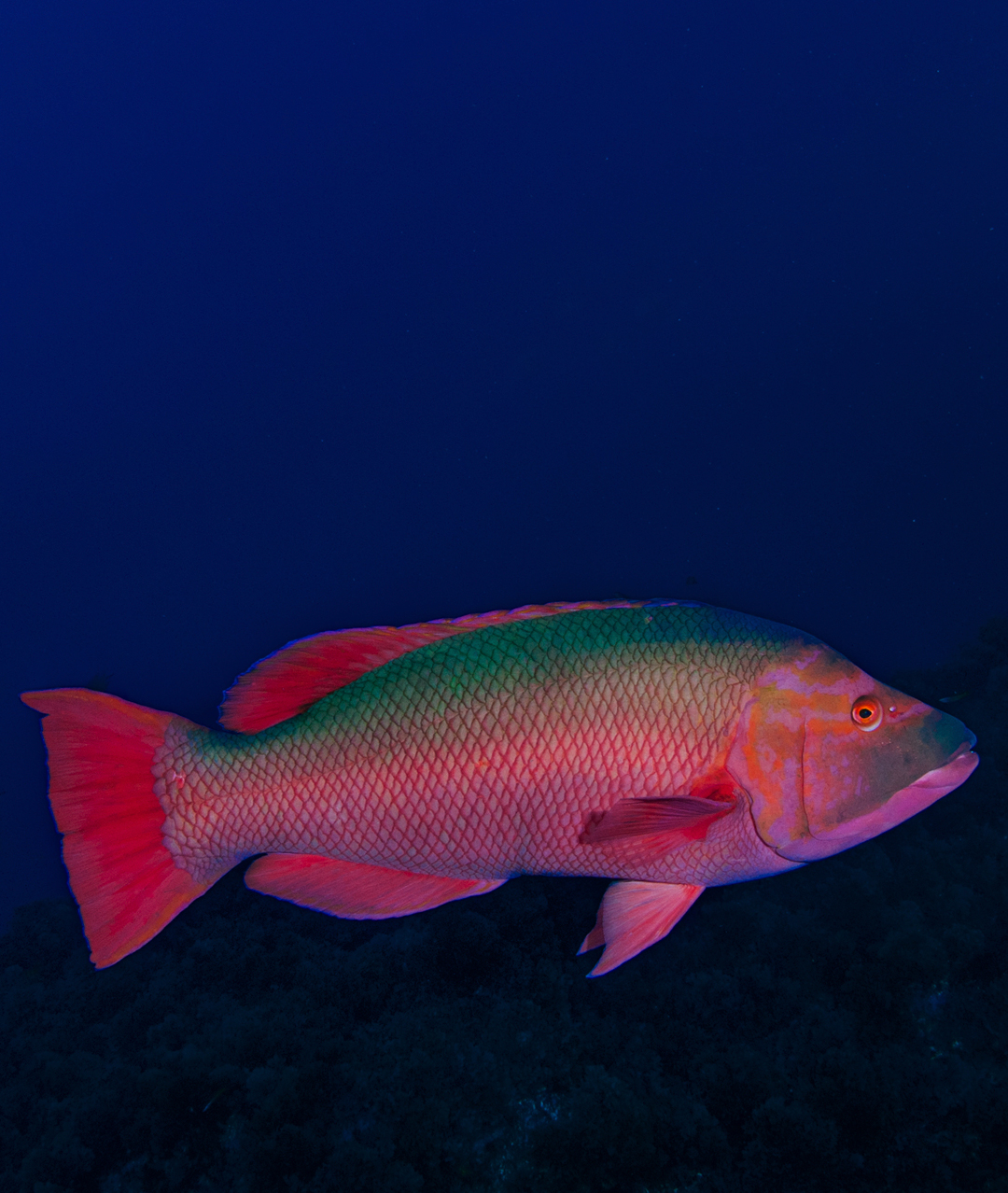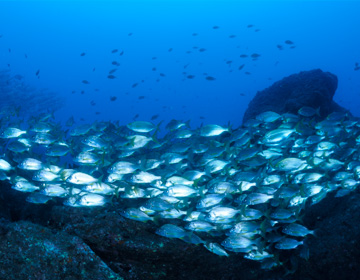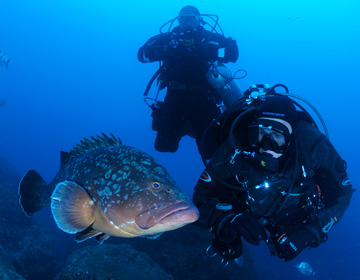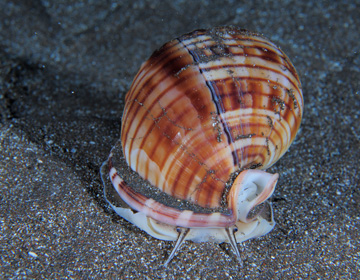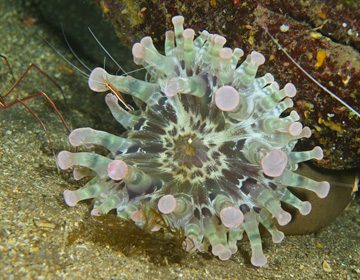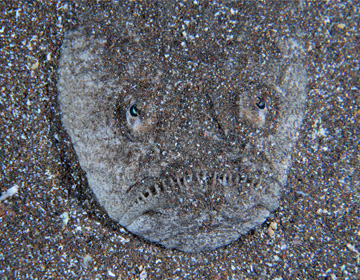Quinta do Lorde
This is a dive site located in the parish of Caniçal, in Machico, next to a hotel called Quinta do Lorde hence the name of the dive site. It is a calm dive with a minimum depth of 5 meters and a maximum depth of 18 meters. During this dive we can find a variety of species like damselfish (Abudefduf luridus and Chromis limbata), turkish wrasse (Thalassoma pavo), arrow crab (Stenorhynchus lanceolatus), octopus (Octopus vulgaris) and others. It is a simple and great dive for beginners. It starts on a rocky bottom at 5 meters deep next to the harbor and it continues towards the sandy bottom where we sometimes see butterfly ray (Gymnura altavela) and common stingray (Dasyatis pastinaca) going west where it is possible to see and follow the conjugation of the rocky and the sandy bottom. On the way back it is possible to pass through an arch that is associated to a small cave, where it is possible to see anemones (Telmactatis cricoides) atlantic dancing shrimp (Cyrtocinetes rigens), golden shrimp (Stenopus spinosus) or even red reef lobster (Enoplometopus antillensis).
Baixa da Cruz
It is located just outside of the harbor of Machico, it is a rock that starts at around 3 meters deep and reaches approximately 30 meters. It is a simples and accessible dive for all divers, being one of the favorites for whoever gets to visit it, due to the abundance and diversity of fauna and flora that can be observed, such as turkish wrasse (Thalassoma pavo), school of bastard grunt (Pomadasys incisus), cow bream (Sarpa salpa), white bream (Diplodus sargus), trumpetfish (Aulostomus strigosus), striped barracuda (Sphyraena viridensis), and others. It is also possible to see anemones (Telmatactis cricoides), red-backed cleaner shrimp (Lysmata grabhami), arrow crab (Stenorhynchus lanceolatus), murays (Muraena augusti), rays (Dasyatis pastinaca; Gymnura altavela) and a lot of black coral (Antipathes wollastoni).
Parede da Queimada
Located at the entrance to Machico’s bay, next to the sports complex of Água de Pena, the wall starts at 30 meters, reaching a depth of 40 meters. We can see black coral (Antipathes wollastoni), school of bastard grunt (Pomadasys incisus) and cow bream (Sarpa salpa) along the entire wall. On the sandy bottom we can find different species of rays like the common stingray (Dasyatis pastinaca) and the butterfly ray (Gymnura altavela). The dive starts near the coast, around 10 meters deep, from where we head south towards the top of the wall. As we swim towards the wall, we find a rock where we can observe anemones (Telmatactis cricoides), red-backed cleaner shrimp (Lysmata grabhami) and Thor shrimp (Humpbacked shrimp). Damselfish (Abudefduf luridus and Chromis limbata) are abundant throughout the course.
Reis Magos
This dive is located next to the bathing area of Reis magos in Caniço, and is a very accessible dive both by boat and on the coast. It consists of a rock wall around the entire beach that starts at 6 meters with a rocky bottom and extends up to 16 meters on a sandy bottom. It is a quiet, sheltered and shallow dive, great for beginners and even more experienced divers as they have a lot to explore. During the dive it is possible to see Damselfish (Abudefduf luridus and Chromis limbata), green fish (Thalassoma pavo), arrow crab (Stenorhynchus lanceolatus), octopus (Octopus vulgaris), black moray eel (Muraena augusti), anemones (Telmatactis cricoides), some Cleaner Shrimp (Lysmata grabhami), flat fish (Bothus podas), mullets (Mullus surmuletos) among others. This is one of the few known places where you can see seahorses (Hippocampus ramulosus) that live in this area. When the light fades with the sunset, this place gains a new charm, and makes this place a highly recommended place for night dives.
Arena
Located inside the Garajau Reserve, the Arena has a rocky formation, where there is a horizontal tunnel that connects to another in the vertical, having its top of 7 meters and the bottom 16 meters. The entrance to this tunnel resembles an arena, hence its name. Along the dive we can see dolphins (Sparisoma cretense), goldfish (Bodianus Scrofa), snapper (Pagrus pagrus), whale (Mycteroperca fusca) and snorers (Pomadasys incisus). At the bottom of the surrounding sand we find hundreds of garden eels (Heteroconger longissimus).
Baixa de Santa Catarina
The low of Santa Catarina is located in front of Santa Cruz, about 500 meters from the coast and 10 minutes from the recreational port of Machico. It is a wall covered in black coral where the top is at 13m and the bottom at 40m. Along the wall we can observe a whole panoply of fish associated with the rocky subtract like, greenfish (Thalassoma turkey), chestnuts (Abudefduf luridus and Chromis limbata), among others. On the sandy bottom it is possible to find large rays (Taeniura grabata). Being a dive away from the coast and sometimes subject to currents requires some experience, but certainly a very interesting dive, where you can observe pelagics.
Garajau
The Garajau is the main dive of the Garajau Reserve and the most emblematic of the island of Madeira. It is a place of choice due to the quantity and diversity of life there, having as ex-libris the Meros (Ephinephelus marginatus), friendly animals that greet us and accompany us throughout the dive. On the rocky bottom, we find moray eels (Muraena sp.), Large anemones (Telmactatis cricoides) and various colors accompanied by their clown shrimp (Thor amboinensis), and shoals of chestnuts (Abudefduf luridus, Chromis limbata), kingfish (Coris Julis) and greenfish (Thalassoma turkey). Close to the surface it is possible to observe shoals of bicuda (Sphyraena viridensis) as well as charuteiros (Seriola rivoliana).
Baixa do Lobo
Named Baixa do Lobo, due to the possibility of sighting of the sea lion (Monachus monachus), it is a dive that starts at 14 meters and reaches a maximum depth of 40 meters on the east slope. It is a dive located in the Ponta de São Lourenço consisting of a rocky platform with walls of sharp slope that end in a sandy bottom. The walls are filled with black coral (Antipathella wollastoni) and we found shoals of Sargos (Diplodus vulgaris), Salemas (Sarpa salpa) and Roncadores (Pomadasys incisus). A dip with clear waters, where the high point occurs when we see the fur seal.
Badejeira
Diving located at the end of Ponta de São Lourenço, east of the island, outside the lighthouse. It is a demanding dive due to the strong currents, but when the conditions are good it is one of the best dives of the island. It is a low that starts at 3 meters and reaches 40 meters deep. At the top we find wrecks of a shipwreck, the boiler being the structure that is in better conditions. Alongside the wreck we observed several shoals, including chestnuts (Chromis limbata, Abudefduf luridus), kingfish (Coris julis) and greenfish (Thalassoma turkey). It is a very attractive dive due to the possibility of seeing large pelagics such as charuots (Seriola rivoliana).
